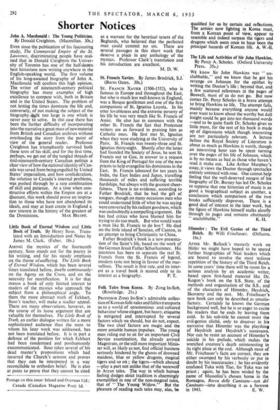Little Book of Eternal Wisdom and Little Book of Truth.
By Henry Suso. Trans- lated with an Introduction and Notes by James M. Clark. (Faber. 18s.) AMONG the mystics of the fourteenth century, Suso stands out for the poetry in his writing, and for his steady emphasis on the theme of•suffering. The Little Book of Eternal Wisdom, which has been several times translated before, dwells continuously • on the Agony on the Cross, and on the necessity for mortification. It is for that reason a book of only limited interest to readers of the mystics who approach the subject from a philosophical angle. To them the more abstract truth of Eckhart, Suso's teacher, will make a readier appeal. There are many observations, however, in the course of its loose argument that are valuable for themselves. The Little Book of Truth, an earlier dialogue written for a more sophisticated audience than the nuns to whom his later work was addressed, has not been translated before. It is in part a defence of the position for which Eckhart had been condemned and posthumously excommunicated. Suso takes several of his dead master's propositions which had incurred the Church's censure and proves that they can be interpreted in a way reconcilable to orthodox belief. He is also at pains to prove that they cannot be cited as a warrant for the heretical tenets of the Beghards, who believed that the perfected man could commit no sin. There are several passages in this short work that deserve a place in any anthology of the mystics. Professor Clark's translation and his introduction are excellent.
M. D. W.


































 Previous page
Previous page